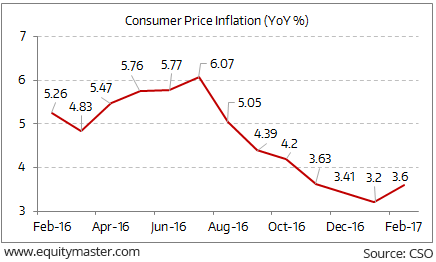India's Third Giant Leap
This Could be One of the Biggest Opportunities for Investors
- Home
- Todays Market
- Indian Stock Market News April 6, 2017
Sensex Trades in Red; Capital Goods Stocks Drag Thu, 6 Apr 01:30 pm
After opening the day on a flat note, share markets in India have remained cautious over the RBI's monetary policy due today and are trading marginally below the dotted line. Sectoral indices are trading on a mixed note with stocks in the capital goods sector and stocks in the metals sector trading in red, while stocks in the realty sector are leading the gains.
The BSE Sensex is trading down by 132 points (down 0.4%), and the NSE Nifty is trading down by 38 points (down 0.4%). Meanwhile, the BSE Mid Cap index is trading down by 0.2%, while the BSE Small Cap index is trading down by 0.4% The rupee is trading at 64.98 to the US$.
In news about the economy. The country's services sector registered second straight month of growth in March, driven by strong rise in new work orders amid softer inflationary pressures.
India's private sector economy stayed on an upward trajectory during March, benefiting from an upswing in demand and output. The country's rapid recovery from the demonetisation-related downturn was accompanied by job creation and softer inflationary pressures, according to the Nikkei Services Purchasing Managers' Index (PMI) survey by Markit.
The Services PMI is the reading of the country's services sector output and is updated monthly. A reading above 50 indicates expansion, while any score below the mark denotes contraction.
The Services PMI continued its expansion and rose from 50.3 in February to 51.5 in March.
It was the second straight month of growth in services sector and the strongest since October 2016. Output and new business rose at faster paces and employment went up the most since July 2015 while business confidence reached a four-month high.
A key factor for the growth was several price hikes by service providers.
Amid reports of the passing on of higher cost burdens to clients, some services companies raised their own selling prices. Firms that kept output prices unchanged mentioned efforts to stimulate demand.
Having deteriorated considerably in November after notebandi, the health of India's service sector showed signs of recovery in January, with the services PMI going up to 48.5. Actual expansion however, began only from February with a slight expansion denoted by a score of 50.3.
While the services PMI has continued to expand, it is nowhere near the pre-notebandi levels of October 2016. However, a pickup in the economy after remonetisation can see the services sector expand to the previous levels.
Going ahead, services companies indicated that activity is expected to rise over the coming 12 months.
On the price front, though input costs for services firms rose in March, and some services companies raised their own selling prices, the overall rate of charge inflation was "slight".
The Reserve Bank of India (RBI) monetary policy statement is expected later today. Experts believe the central bank is likely to hold key rates while unveiling the first bi-monthly review of 2017-18.
The Reserve Bank in its policy review meet on February 8 had kept key interest rate unchanged at 6.25% and said it is awaiting for more clarity on the inflation trend and impact of notebandi on growth.
CPI Inflation at 3-month High

The market consensus is that the central bank is unlikely to cut interest rates today, as upward risks to inflation still persist. One must note that the RBI shifted its policy stance from accommodative to neutral in its February policy review.
Earlier, the RBI had projected retail inflation to be around 4% for the current fiscal, saying that the 7th Pay Commission burden could put an upward pressure of up to 1.50% over two years.
The central bank said it expects the implementation to hurt inflation by 1-1.5% over a two-year period, but added that the shock will not be as strong as that felt during the implementation of the 6th pay panel suggestions. The government has already said it has made provisions for the added liabilities towards implementation of the Seventh Pay Commission due from last year, as well as One Rank One Pension scheme for defence services.
While the RBI may look at interest rates to reign in rising inflation. More than a move on the interest rate, market participants expect the central bank to introduce measures to squeeze excess liquidity out of the banking system and deal with banks' bad loan woes.
Regarding the RBI's decision, it's hard to predict what the RBI will do and how the markets will react to it. As the central banker looks at several local and global factors when figuring out the interest rate.
The unpredictability surrounding the RBI's decision can lead to market volatility, and the best thing to do in such a scenario could be to stay focused on the value and comfort of the safest stocks.
For information on how to pick stocks that have the potential to deliver big returns, download our special report now!
Read the latest Market Commentary


Equitymaster requests your view! Post a comment on "Sensex Trades in Red; Capital Goods Stocks Drag". Click here!
Comments are moderated by Equitymaster, in accordance with the Terms of Use, and may not appear
on this article until they have been reviewed and deemed appropriate for posting.
In the meantime, you may want to share this article with your friends!